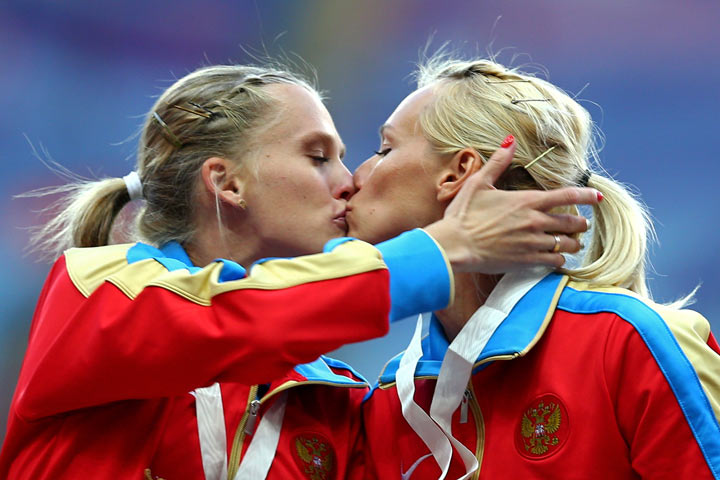TORONTO – From Usain Bolt’s gold-medal-winning 200m sprint, to hometown hero Andy Murray’s gold medal performance in men’s tennis singles, the London 2012 Olympic Games had it fair share of moments on social media.

Dubbed “the first social media Games,” the London 2012 Games generated over 150 million tweets over 16 days.
Now, spectators worldwide are waiting to see what the conversation will be on social media during the 2014 Winter Olympic Games in Sochi, Russia. Will it be the Canadian hockey teams, or Jamaica’s famed bobsled team setting records for Tweets per minute?
Or will it be Russia’s controversial political views that eclipse the Sochi 2014 coverage?
“I assess that these will be a more politicized Olympics,” said sociology professor at Queens University Vincent Mosco.
“This is an opportunity for people who oppose the Russian government and Vladimir Putin to get their views out to a global audience.”
Many have publically scrutinized the International Olympic Committee (IOC) for holding the Games in Russia – a country with a tumultuous political background and one that has recently made international headlines for its anti-gay laws.
READ MORE: Gay Russian protester detained at Olympic relay
U.S. President Barack Obama will not be attending the Games, and instead has put together a committee that will go in his place, including people associated with the gay rights movement such as former tennis player Billie Jean King.
“It depends on what your interest is in the Games – there are people who are simply interested in how our hockey team does, and others see the Games as an opportunity to put political issues on the table,” said Mosco.
“It’s certainly the issue of gay rights that is in the forefront, but it’s also the generally authoritarian positions of the Russian government – free speech and opposition – that will become important during the games.”
READ MORE: Putin says Russia needs to ‘cleanse’ itself of homosexuality
Mosco said it’s too early to tell whether those political statements will overshadow the Games, but noted it will impact coverage of the event.
“How they do it – and how peacefully they do it – is a matter that’s hard to assess at the moment,” he said.
But the real controversy may be shown through photographs.
“Instagramming the Olympics is going to have a big impact politically, as well as socially,” said Sidneyeve Matrix, mass communications professor at Queens University.
“A picture speaks 1,000 words – we’ve already seen some controversy happen with the two Russian athletes who shared a kiss on the podium.”
In August Russian athletes Kseniya Ryzhova and Tatyana Firova shared a kiss on the podium in Moscow after the women’s 4X400-metre relay race. Initially it was assumed that the kiss was in protest of Russia’s gay rights views; though the women later denied those claims.
The image of the kiss quickly went viral.
But it won’t necessarily be the images taken at Olympic events – or even on the Olympic grounds – that will make the most fuss; there is a chance that off-site protests could create some powerful imagery.
“Photographs grow legs on the social web,” Matrix said.
Athletes under strict social media rules themselves
Athletes will also be under watch when it comes to social media use during the Games.
“Athletes are not immune to racist, sexist, or other kinds of negative statements about their experience and this will likely intensify in Sochi because of the controversy surrounding Russia’s policy surrounding gay athletes and people in general,” said Mosco.
READ MORE: Profiles: Team Canada athletes at the Sochi Olympics
The IOC has a social media, blogging, and Internet guideline for participants and “accredited persons” at the Games – one that includes a rule about “no political statements.”
The guidelines also note, “Postings, blogs and tweets should at all times conform to the Olympic spirit and fundamental principles of Olympism as contained in the Olympic Charter, be dignified and in good taste, and not contain vulgar or obscene words or images.”
The Canadian Olympic Committee told Global News that its athletes are encouraged to use social media at their discretion within the IOC’s guidelines – but a spokesperson said the COC has no additional policies for its athletes.
“I’m not surprised that the IOC is doing this because they want to contribute to their clean image,” said Mosco of the IOC’s rules.
“But, you can only control the behaviour of people to a certain extent.”
During the London 2012 Olympics Greek triple jump athlete Voula Papachristou was expelled from the Games after posting a racist joke on her Twitter account, while expressing support for a far-right political party.
Switzerland soccer player Michel Morganella was also banned after a racist tweet following a loss to the South Korean team.
“Some of the controversy from London had to do with Internet trolls– I remember there were stories in the media about athletes reacting in the heat of the moment,” added Matrix.
“Certainly the first thing we are going to think about is censorship. But when we look at it from another angle it could just be to protect the athletes and help them focus.”




Comments